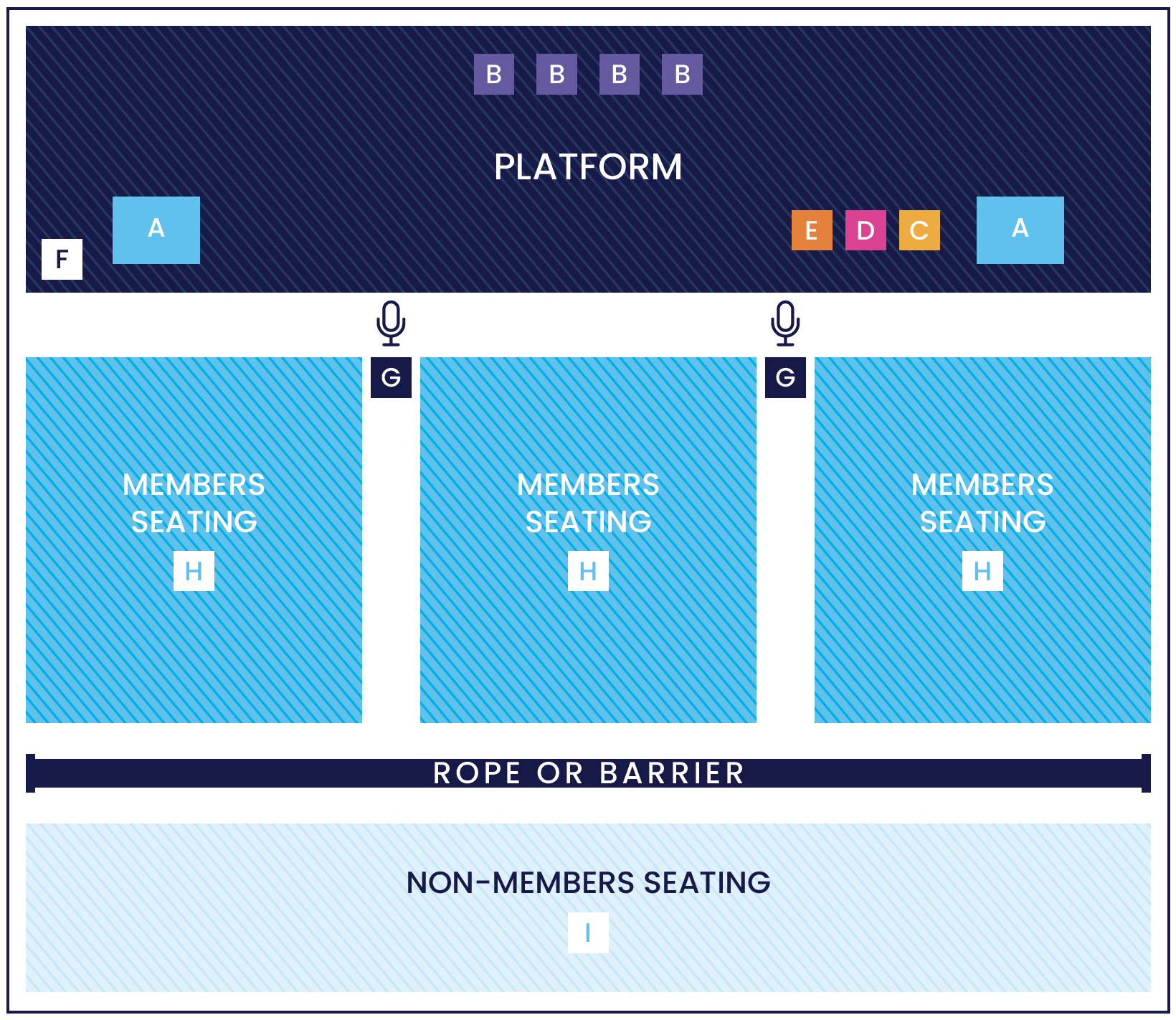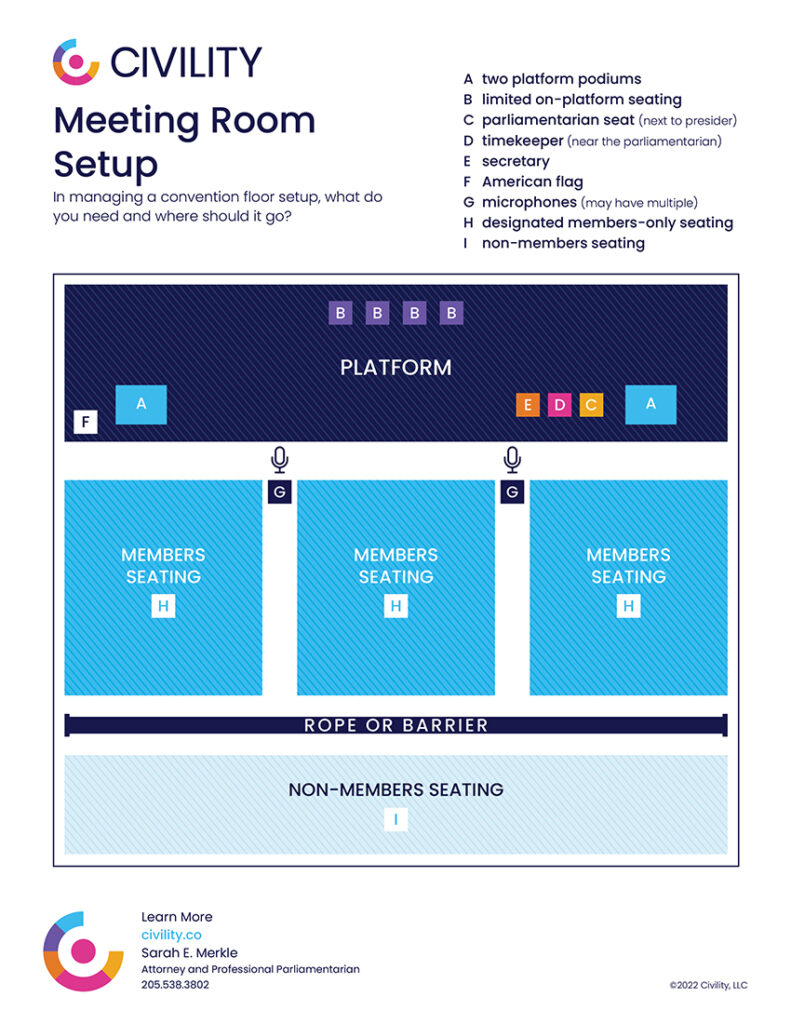Let me guess…. You’re a key staff member or elected leader in your organization, and the mere mention of “the annual business meeting” gives you instant anxiety. You procrastinate, struggle to get organized, and are unsure what’s “okay” according to parliamentary procedure. Well, today’s post is written to give you confidence, visual guides, and concrete steps to take as you get ready for that next meeting.
1. Decide meeting parameters—goals, date/time, quorum needed.
Let’s start at the very beginning. These overarching details—what the meeting is for, when it will be held, and who will need to attend—may seem very basic. But by settling these first, in writing, you accomplish a couple important things.
- You get rolling on the prep work (as opposed to delaying).
- And you establish some boundaries that are critical for future steps (e.g., you can’t give notice of a meeting if you don’t have a date and time, and you don’t want to be scrambling to figure out a quorum at the last minute).
So, have a pow-wow with the rest of the leadership and make sure the goals of your next meeting are clear. Then, get it on the calendar. Then, calculate the quorum and notify the secretary of that magic number of attendees needed for the upcoming meeting.
2. Develop an agenda and draft accompanying script.
This one is big—maybe bigger than you think. I can’t stress enough that it is important to create an agenda that is specifically suited for the needs of that particular meeting.
While it is definitely easiest to resurrect last year’s agenda, modify the date, and hit “Print,” easy is not the only point in this case.
Here are a few other good reasons to adopt a different order of business than the standard Robert’s Rules of Order six-part agenda:
- Consider your meeting goals. (See step 1. Goals should definitely guide your agenda.)
- Consider what’s most efficient. (Guess what? You can lump non-controversial business into one vote!)
- Consider whether you have a very important piece of business to cover. (You don’t want that left till last when everyone’s ready to leave.)
The bottom line is that you don’t have to use the same-old agenda every year just because it’s what’s always been done. There are reasons to spend a little time and create a fresh take on things.
And, once you have an order of business for the meeting, you can follow that up with a script. Few presiders can wing it and say the right thing as they explain issues, manage motions, or call for a vote. My suggestion? Type out exactly what you plan to say for each agenda item.
3. Consider using an Open Forum.
If you’re concerned about managing extra ideas, slightly off-topic questions, and less relevant discussion (because, let’s face it—every group has some of those members), then the Open Forum (also called a Members Forum) is perfect for you.
 An Open Forum gives everyone a voice by letting members ask questions or share opinions with the Chair and the Board regarding non-agenda matters. It happens after the meeting has been adjourned, and there are speaking limits involved. And anyone who wants to participate in this extra post-meeting opportunity has to sign up ahead of time.
An Open Forum gives everyone a voice by letting members ask questions or share opinions with the Chair and the Board regarding non-agenda matters. It happens after the meeting has been adjourned, and there are speaking limits involved. And anyone who wants to participate in this extra post-meeting opportunity has to sign up ahead of time.
To prepare for this, download the Open Forum Tools PDF from the Civility resources page. It’s a multi-page document already set up for you and includes rules and a signup sheet that are easy to distribute ahead of time or post at the entrance to the meeting room.
4. Set up the meeting room.
Speaking of the meeting room…. Not sure about microphone placement? What about the American flag? Podium? Seating? Civility has you covered.
 Download this free diagram on the Civility resources tab—it shows a simple setup for a meeting room or large convention hall. All key items are pictured, and the visual shows you how to arrange all the critical parts of the room.
Download this free diagram on the Civility resources tab—it shows a simple setup for a meeting room or large convention hall. All key items are pictured, and the visual shows you how to arrange all the critical parts of the room.
And while room setup might be taken care of for you (by onsite staff or others), it’s prudent for you, as a leader for the event, to check ahead of time to make sure nothing is forgotten or misplaced in preparing the physical space.
Where to Learn More


